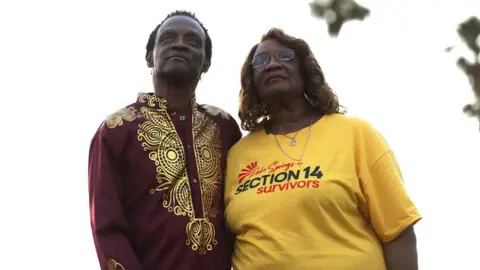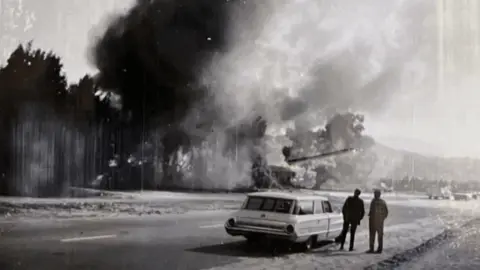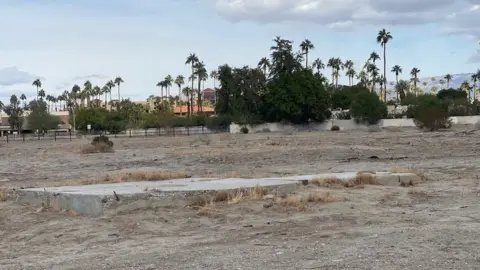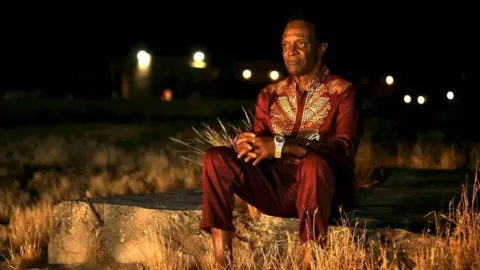California reparations: How do you put a price on racism?
 Carin Dorghalli, BBC News
Carin Dorghalli, BBC NewsAlvin Taylor and his sister, Pearl, were kids when the City of Palm Springs, California began burning down their neighbours' homes. But they still remember the smell of the smoke.
"We would come home, and a neighbour's house would be gone - just burned rubble," Pearl Taylor Devers said.
In 1965, the City of Palm Springs began razing the Taylors' predominantly black neighbourhood to make way for commercial development near the city centre. Their father, a carpenter, had built their modest home from the foundation up. Their mother, a house cleaner, had worked for celebrities like Lucille Ball and the family of Amelia Earhart, and took the children to church every Sunday.
The Taylors grew up in an area of Palm Springs known as Section 14; racial segregation made the neighbourhood one of the few places where black people could purchase a home.
But that was before the fires. Every week a new home would go up in flames - sometimes with a neighbour's belongings inside. The Taylor family moved from home to home in Section 14, trying to outrun the flames. Each time their house was destroyed.
After a lengthy investigation, a 1968 report from the California Department of Justice deemed the destruction of Section 14 a "city-engineered holocaust".
 City of Palm Springs
City of Palm SpringsNearly six decades later, survivors of Section 14 could finally see restitution after the California Department of Justice Reparations Task Force issued a sweeping set of reparations proposals last week.
The thousand-page report sets out 115 legislative recommendations to address inequalities among black Californians and ensure that injustices - like the destruction of Section 14 - never happen again.
Among the recommendations is a controversial proposal for cash payments of at least $1.2m (£943,400) to each black descendant of slaves.
Members of the task force said they hope their report helps the public understand the true cost of racism in California, regardless of whether the government ends up deciding to give direct cash payments or not.
The issue is highly divisive in the state. A new poll from the Public Policy Institute of California found that 54% of likely California voters had an unfavourable view of the task force, while nearly the same amount, 59%, believe the state should offer a formal apology for human rights violations and crimes against humanity on African slaves and their descendants.
The atmosphere was charged on Thursday, when the report was presented to the public, with some saying payments could not come soon enough.
"It's my money, and I want it now," one woman yelled.
Others said it was unfair to ask this generation to pay for the sins of the past through reparations that will ultimately be funded by tax dollars.
California Republican Assembly member Bill Essayli, who is Lebanese-American, said he opposes the recommendations of the task force.
"This whole thing of focusing on people's race and victimhood, [it] is nothing but an attempt to divide Americans and pit them against each other," he told the BBC.
Nothing untouched by racism
This debate is nothing new. Americans have argued over the idea of reparations since the end of the Civil War.
In recent years since, members of Congress have tried - and failed - to establish a commission to study proposals for reparations for African Americans.
While reparations efforts might have stalled on the federal level, local discussions have intensified, especially in the years since the murder of George Floyd. Evanston, Illinois became the first city in the US to give financial compensation for racist housing discrimination. But California's plan, if implemented, would be the most sweeping to date.
Dr Cheryl Grills, a clinical psychologist who specialises in racial trauma and was appointed to the task force, said it is necessary to acknowledge how the past continues to impact people today.
"Enslavement may have ended, but the ideology and the mechanisms to try to keep black people at the bottom are very much still with us," Dr Grills said.
 Section 14 Survivors
Section 14 SurvivorsIt's a lesson the Taylors say they learned first-hand. They say the destruction of their home in Section 14 formed a core memory that would shape the rest of their lives.
Their father, a proud man, refused to abandon the home he built for his family. He tried in vain to secure a loan to buy the land, but at a time when most banks refused to give black Americans mortgages, he was left with few options.
He began to drink heavily to cope with the stress; eventually, Pearl said, their mother packed up the children and left Palm Springs and their father behind.
"We weren't there to see the actual day that he was pushed out of the home. I'm sure it was very traumatic for him," Pearl said. Mr Taylor ultimately died from alcoholism.
As a young man, Alvin Taylor threw himself into music and channelled his prowess at drumming into a career playing alongside famous acts like Little Richard, The Beatles' George Harrison, and Elton John.
For a while, success numbed the pain of losing his childhood, his home and his father. But when that stopped working, Mr Taylor said he turned to drugs.
"I was looking for an escape."
After a years-long battle with addiction, Mr Taylor was sent to prison. Now, at 71, he believes the destruction of his home is the root of his struggle with addiction.
"Looking back, it feels like we were really treated like animals and disregarded as human beings," he said.
Calculating the cost of racism
Experiences like the Taylor's are part of the reason California assembled the task force. But how do you put a dollar amount on the harms of racism?
To calculate the cost, the task force looked at state data on the financial impact of harms in five categories: health, housing discrimination, unjust property takings, devaluation of black businesses, and mass incarceration and over-policing. The task force said this list of harms is not exhaustive, and may be added to at a later date, which could raise the total cost beyond the $1.2m person outlined in the report.
Their calculations were meant to be educational estimates - an "intentionally conservative" effort to underscore that there is a financial cost to racism in America.
The challenge of determining just how much restitution would be paid, however, will ultimately fall to California's state lawmakers, who will vote on whether to adopt the recommendations found in the final report. They could decide to issue only a portion of the recommended amount, or compensate people in other ways, such as through loan forgiveness or other social programmes.
The state is currently in a budget deficit, and some have speculated that Governor Gavin Newsom, a Democrat, is unlikely to support a multi-billion dollar cash pay-out.
Previously, he said: "Dealing with the legacy of slavery is about much more than cash payments."
As the child of immigrants, Assemblyman Essayli said he feels it would be unfair to force everyone in the state to pay for reparations.
"My family had nothing to do with slavery. California was never a slave state," he said. "I think racism is just an ugly part of humanity and I just don't understand how we're going to quantify racism for a particular group."
For Donald Tamaki, an attorney, civil rights advocate and the only non-black member of the task force, the backlash has been frustrating, but predictable.
Critics, he said, have "sticker shock" because they're not used to framing reparations as a societal obligation. For his part, Mr Tamaki said he equates funding reparations to using tax dollars to fund public schools, even if you don't have children.
But there is a precedent for cash reparations - one Mr Tamaki is personally familiar with.
His family was among the more than 120,000 Japanese Americans forced from their homes and into government-run internment camps at the start of World War II.
In 1983, Mr Tamaki served on the legal team that helped pave the way for the 1988 Civil Liberties Act, which officially apologised for Japanese internment and paid $20,000 to each surviving former detainee.
"For most Japanese Americans, it was getting their dignity back," he said.
 Carin Dorghalli, BBC News
Carin Dorghalli, BBC News'No dollar amount can make up for what was done'
Years after the City of Palm Springs reduced their family home to rubble, Pearl and Alvin's mom was finally able to purchase a new house -- and the land as well.
"She was so excited telling her sister," Ms Taylor Devers recalled. "She was feeling really confident that this home was not going to be burned from underneath her or taken away."
That resilience and determination to not only rebuild, but thrive, is the essence of what it means to be black in America, Ms Taylor Devers said. But it has come at a steep cost.
Speaking onstage at a Juneteenth rally less than a mile away from where her family home once stood, Ms Taylor Devers encouraged her fellow Section 14 survivors to remain vigilant in their fight for justice and reparations.
Standing just offstage, Alvin Taylor nodded in agreement. Later that evening, he cautiously picked his way across desert stones and scrub brush to stand on the concrete foundation that had once been his home.
After 60 years, the parcel of land remains undeveloped.
"There literally isn't a dollar figure that could compensate for the harm that was done. We realise that," Pearl said. "But I think that the idea that some type of restitution would be attempted to be made would be very helpful."
